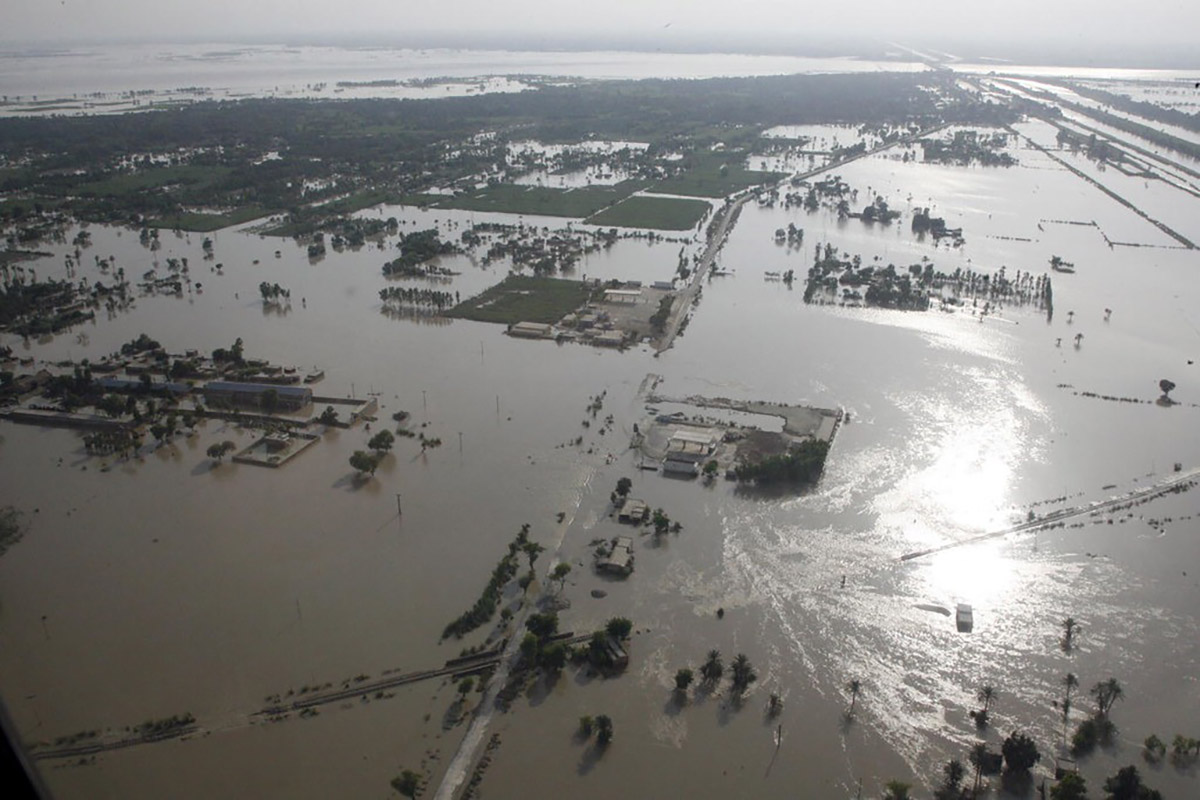December 20, 2022
The floods that have devastated Pakistan this year are a stark reminder of the fragility of our food systems, particularly in countries on the frontline of the climate crisis. Jesse Sam reports.


If anyone needed a reminder of why ‘loss and damage’ was the mantra at the recently concluded COP27, Pakistani delegates were only too happy to provide one.
“The dystopia has already come to our doorstep,” said Sherry Rehman, the country’s climate minister, in an interview with Reuters. It was Pakistan that led lobbying efforts on behalf of 134 developing nations as chair of the G77 (and China) negotiating bloc. Their call was clear: countries like Pakistan are on the frontline of a changing climate and they need direct financial assistance to adapt to increasingly devastating disasters.
Disasters like flooding, which hit the southern provinces of Sindh and Balochistan during this year’s monsoon season. The scale of damage is extraordinary. In human terms, at least 1,500 people have died; thousands have suffered injuries. More than 300,000 homes have been destroyed and as many as 33 million people have been affected.
The economic damage is even starker. The government puts flood-related losses at $30 billion — that’s equivalent to around 10% of the country’s GDP.
Agriculture accounts for nearly a fifth of that GDP and has been one of the worst affected industries, along with housing and telecommunications. Direct losses to the agriculture and livestock sector are estimated at $3.7bn, according to the World Bank. That includes some 2 million acres of crop damaged and more than 700,000 livestock lost.
Long-time GPC member, GPCYP pioneer, and Chief Operating Officer of the pulses trader Bombi’s Group, Faisal Majeed, has been counting the cost to his industry. In Majeed’s view, the impact and implications of the floods can be traced through two key crops — rice and wheat— each of which has unique considerations.
Rice was one of the least badly affected crops in the floods. Pakistan produces around 9 million tons [mt] every year. Most of that is for export, as rice is not a big part of people’s diets. (Per capita consumption is around 18kg, compared with 190kg and 78kg in Bangladesh and India respectively.)
Majeed points out that in the Sindh province, the rice crop “was already sown and ready to be harvested” when the floods hit. Analysis by the Pakistan Agricultural Research Council [PARC] shows that the Sindh province lost 1.9mt of rice — around 80% of the total expected production — at a total value of $543m. Despite this disruption, the rice exporters’ association expects the country to meet its annual export target (around 5mt).
That is welcome news for the governemnt, as rice exports earned $2.5bn in 2021/22, providing much needed foreign currency at a time when the country’s reserves are dwindling. It’s also welcome news for a squeezed global food system at a time when India (the world’s largest rice exporter) has banned exports. Pakistan is the fourth-largest rice exporter, with food-insecure, low-income countries like Afghanistan and Niger among its fastest-growing export markets.
Wheat is a different story. “Our staple food is wheat,” Majeed points out. “Wheat was to be sown after the harvest of rice. But by September and October, the growing areas in Sindh province were still flooded,” he continued. By some estimates, wheat production in Sindh could be 50% lower in the 2023 harvest season.
In anticipation of a potential shortfall next year, the government is taking action to secure wheat imports from Russia. In early November, there were reports of a $112m deal to import 300,000mt.
Majeed says that such government-to-government deals are essential right now, as non-tariff barriers make private trade with Russian parties very challenging. “Opening letters of credit [LC] is very difficult right now. We have to get approvals from the state bank before any LC is processed, and that takes about two weeks.”
Pakistan has maintained relatively close ties with the increasingly isolated Russia, following that country’s invasion of Ukraine. Former prime minister Imran Khan insists that his visit to Moscow on the day Russia launched the invasion was an unfortunate coincidence. Nevertheless, Khan’s successor, Shehbaz Sharif, has since been photographed shaking hands warmly with Putin, who described Pakistan as a “priority partner in South Asia”. This new food security crisis has only deepened ties between the two countries.
As a trader, Majeed pays special attention to the logistics sector, as prices there determine the viability of imports and exports.
After the floods, there was a surge in food aid to Pakistan which Majeed noticed led to increased demand for containers. “Containers are popular because not everybody can buy into the bulk vessels, where the minimum volumes are huge.”
But while containers may be more affordable, they are also less reliable according to Majeed. “Shipments are getting delayed — you can be waiting at the port for up to 60 days, which makes it difficult to schedule cargo. Bulk vessels are much more direct.”
Away from logistics, Pakistan is also counting the much deeper, long-lasting cost to its national infrastructure. Before the floods, ambitious projects like the ongoing Kachhi Canal development were set to grow Pakistan’s agriculture sector by irrigating a further 700,000 acres in Balochistan, one of the provinces worst affected by the floods. Now, according to Majeed, the focus is on rebuilding rather than growing. “A lot of infrastructure was destroyed. So I think this flood has pushed us back 10 years.”
That assessment is a stark reminder of the escalating impact that climate-fueled disasters will have in the coming years and decades, something Majeed is keen to stress. “Every year we will experience extreme heat, extreme rains, extreme cold — more and more extremes.”
As Pakistan begins the difficult process of recovery, the words ‘loss and damage’ seem to take on an altogether more urgent and tangible meaning.
You can donate to the UNICEF Pakistan floods appeal here.
Disclaimer: The opinions or views expressed in this publication are those of the authors or quoted persons. They do not purport to reflect the opinions or views of the Global Pulse Confederation or its members.